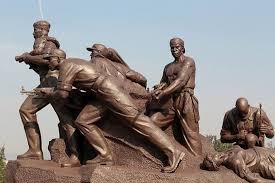WHEN THE SUN GOES DOWN,STORY ONE: The Guilty
by admin on | 2024-09-24 07:53:11 Last Updated by admin on2024-11-15 02:18:35
Share: Facebook | Twitter | Whatsapp | Linkedin Visits: 360

The
Guilt by Rayda Jacobs ( South Africa)
Lilian Thurgood was
busy picking guavas at the side of the house when she heard the growling of the
Alsatians on the stoep. Just a low growl telling her that someone had stopped
at the gate. Perhaps it was the postman, she thought, dropping something into
her box. She looked about her for a moment. They were at the end of winter, the
morning fresh with the footprints of rain. She marveled at the brightly
coloured new tips of trees, the pots of purple and pink geraniums with
cellophane drops glistening on the leaves, the cluster of basil and oregano
sprouting near the lemon tree. She liked the mornings, when God’s breath was
hot on the earth and steam rose from it in easy surrender. Then she heard the
growling again. Still low, but more intense. Someone had stopped at the gate
and was not going away. She put down the basket with the guavas, and reached for her cane.
She reached the front
of the house and saw Tembi and Tor like sentinels at the gate. Fierce and
powerful dogs, they had been trained by her late husband to follow specific
commands. It was the man’s calmness that held them back.
“Can I help you?”
Lilian asked.
“I am looking for work,
madam.”
“I don’t have any
work.”
He reached into a brown
envelope and lifted out a plastic wrapped sheet of paper. “I am from the
Transkei, madam. I have here a letter.” Lilian Thurgood looked at him. He was
young, persistent, wore dark pants and a jacket that had seen darning and
letting out, but was clean. She had seen these letters before, but took it from
him anyway. As she suspected, a letter
on a home- made letterhead- the paper dirty, water- stained, dog-eared- saying
William Sidlay was collecting donations on behalf of some organization. The man
was doubly prepared. If he could not find work, he would ask for a handout. The
letter made it easier to beg. She handed the letter back through the grill of
the gate. The gate was locked, the wall round the property ten feet high.
“Wait here,” she said.
“Thank you, madam.”
Lilian left him at the
gate and started to walk to the house, listening to the renewed growls of the
dogs.
In the house, she
looked for change in her purse. She knew it was a mistake. She should have been
hardened by now. Every day people knocked on her door for food, old clothes,
money, and work. Most days she did not answer. They took merciless advantage,
especially since the new government. There was a boldness not seen before.
She remembered the
African woman who had knocked at her door one night at nine. Lilian did not
want to go out. It was raining, a long walk to the gate, but there was the
woman, with a child on her back and one at her side. Did the madam have garbage
bags, she called. An unusual request, especially at that time of night. And
Lilian could not see well in the dark. What if there was a second person
waiting behind the wall with a knife or a gun? The papers were full of stories
of people getting killed in their own gardens and houses, and she had heard of
husband- and- wife crime waves.
She went to the gate.
There was no one but the woman and her children, but it irked her that she
should be afraid in her own home, that they thought it all right to knock on
your door any time of the day or night. Was it racist if you were afraid and
did not want to open your door to strangers? But, of course, she knew what it
was. It was making good on the guilt, the guilt they were accused of having. As
benefactors of the old regime, whites were shot through with guilt. And where
there was guilt there was opportunity. Like the woman who saw her sit on the
stoep the other day and begged Lilian to buy four geranium plants for two rand.
Her garden was overcrowded with flowers, but the woman insisted. If the madam
would buy eight plants for four rand, she would even plant them. Lilian had felt
sorry for the woman and opened the gate. The woman threw herself to the ground
with her grocery bags in which she kept the plants individually wrapped in wet
newspaper, and asked for water so she could wet the ground. Lilian went round
the side of the house for the hose and when she returned, there was the woman
with thirty plants in the soil. How she had managed to plant so many in a few
minutes, Lilian did not know. “Please madam,” the woman begged, “it’s almost
five o’clock. I karn go home with these last few plants. Madam won’t regret it,
madam will see. I’ll even give madam a special price, twelve rand.” Lilian gave
the woman the twelve rand.
Then was the man who
had rung persistently at her gate, and when Lilian came out, he asked for money
for the bus as he did not know how he was going to get home. When Lilian told
him she had no money, he asked for clothes, and when she said she had none, he
asked for food. But not brown bread, he added. Could he please have a tin of
fish?
Lilian’s thoughts returned
to the young man waiting at the gate, and she fished around in her purse for
loose change. There was only a five- rand coin and twenty- three cents. Five
rand was a lot of money for a pensioner to give away, but she could not give
him twenty- three cents. What could a grown man do with twenty- three cents? He
could not even buy a cigarette. She was suddenly angry. Angry that she should
be standing there examining her conscience. That she should feel guilt for his
circumstances, and shame for the forged letter in his hand, for having to beg,
for raising these emotions in her. She was a pensioner. What money did she
have? If her husband had been alive, he would have ordered the man off the
grounds. Lilian went outside and found him still at the gate trying to be
friendly to the dogs. She gave him the five- rand coin. He took the money, and
then vigorously nodded his head.
“I can’t take this five
rand.”
“What do you mean?”
Lilian asked, not understanding him.
“I can’t just take
madam’s five rand. Let me do some work for it.
I see madam has many
leaves from the trees on the grass. I can clean it up for madam. I want to work
for it.” “It’s all right. Take it. It’s a donation, isn’t it?”
“Yes, madam, but it’s
five rand. I can clean madam’s garden.”
“It’s quite all right.
Please.”
“No, madam, I insist.
Look over there, look at all those leaves.”
Lilian looked at the
carpet of leaves covering half of the garden. She did not have the stamina to
argue. “All right,” she said, knowing herself to be foolish to open the gate.
William stepped in, and the dogs moved forward, pink tongues idling in
readiness. Lilian made a signal and they relaxed.
“Your name is William?”
she remembered the name on the letter.
“Yes, madam.”
“William, just those
leaves over there.”
“Does madam think I’m a
skelm? That I want money for nothing? Those leaves are not even two rand.”
“Well, just do five
rand’s worth, then. Really, you don’t have to do anything. I gave you the
money. Just those leaves over there. I’ve got to go out in a few minutes.”
“Don’t worry, madam.
I’ll be finished now, now.”
Lilian remained at the
gate and watched him remove his coat as if he was going to tackle the whole
garden. She knew that he knew she was not going anywhere, that opening the gate
was more a show of trust than a display of fearlessness.
The rake was under the
guava tree and she watched him fetch it and sweep up the fruit, sorting the
good ones from the pile. He would take them, he said, if she had no use for
them. She said it was all right and watched him collect curled fig leaves and
other debris, and stuff them into the bin.
“That’s enough,
William. Thank you. I really appreciate it.”
“No, madam.”
“Really, it’s all
right. You’ve done enough.”
The telephone rang and
Lilian excused herself. The dogs followed her into the house. She would not
lock the door behind her, she told herself. She trusted him. She would show him
that she did. She would not make him feel like a criminal. Black people knew
that white people were afraid of them. She would show by her actions that she
was not one of them. But what if she was wrong? What if he came in after her
into the house? The old revolver was in a box at the back of the wardrobe, she
would not even know what to do with it. Lilian reached the phone, but the
caller had hung up. She became aware of the pulse. Racing. Frantic. She stood
for a minute to calm down. She turned. William was at the door.
“Madam?” he said
nervously.
“Yes?”
“I’ve raked the leaves
and cleaned up the guavas.”
“Thank you, William.
I’ll unlock the gate for you now.”
“I’ve worked one hour,
madam. That’s ten rand.”
The effrontery shocked
her, but lasted only seconds. Lilian did something with her hand, and the dogs
rose. “I’ll ask my husband for the money,” she said.
“There’s no husband,
madam,” he said in a calm voice. “Madam lives alone. Why’s madam so afraid? I’m
not a thief. Madam will give me the money?”
Lilian’s purse was on
the mantelpiece and she reached for it. In front of him she took out a ten-
rand note. The tone of his voice had changed, and somewhere deep inside her,
she felt a terrible chill. She was painfully aware that the only thing between
her safety and his will, was the dogs.
“I only have this ten-
rand note. You can give me back the five rand I gave you.”
“Madam wants change? I thought
the five rand was a donation. Madam owes me ten rand for the work I did.”
Lilian looked at him. The smile on his face told her that he thought her a
stupid old woman. That she had no choice. Still, she could not get herself to
give him the money. “Leave my house, please,” she said.
“The ten rand, madam.”
“Now, or I’ll call the
police.”
He came forward.
“Sa!” Lilian commanded
the dogs.
The bitches leapt-
Tembi at William’s wrist, Tor at his collar- and knocked him to the floor.
William screamed at the top of his lungs as the dogs ripped at his clothes and
nipped with their sharp teeth at his hands and arms.
Lilian looked at him
squirming under the canines. The Alsatians had their snapping mouths
dangerously close to his face, slopping saliva all over him. They would
terrorize, but not draw blood, not until the other command. Lilian had never
had to try that out on them yet. She did not know what the dogs might do if she
gave the last signal.
“Please, madam,
please!” William shouted. “I’ll leave!”
Lilian left him
struggling under the dogs and went to her bedroom. In the wardrobe, she found
the little brown box behind Jock’s army paraphernalia, and drew out the
revolver wrapped in a piece of green felt. It was heavy , smooth, and she
stroked it with her fingers, strangely calmed, aware of the screams in the
front room. She could not remember whether Jock had said it was the revolver or
a pistol that had a safety catch, and could not remember how to check if the
chamber was loaded. There were no bullets in the box. Gripping her hand tightly
about the weapon, she limped out. There was a tremendous surge of something
pumping through her veins. She was not Lilian Thurgood. She was a woman
possessed of only one thought: to come out of the situation alive. In that
moment she understood that it took very little to pull a trigger, and that the
distance between rational thought and insanity was no distance at all.
“The law says I can
shoot if you trespass on my property,” she pointed the gun down at him.
William’s eyes danced
around in his head like cherries in a slot machine. His jacket was in shreds,
the front of his shirt and face wet with snot and dog spit.”
“Please, Madam,” he
begged, “don’t shoot!”
She tightened her
finger on the trigger.
“It would be good for
some old woman who’s afraid to sleep with her windows open, to read what I’ve
done.”
“No, Madam!!”
Lilian Thurgood loomed
over him. She could not separate fear from insanity, her trigger finger acting
independently of her thoughts. For a few seconds she felt trapped in a vacuum
and could not move. The moment passed and she stared down at the gun trembling
in her hand. She snapped a command, and the dogs took their paws off his chest.
“Get up, and put the
five rand I gave you on the table,” she said
William struggled up on
his feet. He felt his jacket, but there was no pocket left.
“It’s in your pants,”
Lilian said.
He slipped his hand
into his trousers and took out a handful of silver.
“Just what is mine. Put
it on the table.”
William did as he was
told.
“Now walk backwards out
the door so I don’t have to shoot you in the back.”
With the dogs nipping
at his knees, William reversed gingerly out the door, tiptoeing backwards down
the stone path to the gate. Lilian had the gun pointed at him the whole time,
her eyes never leaving his face.
“I’m going to report
you to the police, William. I’m going to give them your description and tell
them about the scar under your left ear, about the letter you walk around with,
about your evil little scheme to get yourself on someone’s premises. I’m going
to report you not because I think they’re going to catch you, but because I’m
going to shoot you if you come here again.”
Lilian unlocked the
gate and watched him edge nervously out. William was wide- eyed, still expecting
her to pull the trigger. Without a backward glance, he ran down to the main
road where he turned the corner and vanished from sight.
Lilian Thurgood stood
very still. Her heart was racing, but the pain in her leg had disappeared. She
was stunned. She could not believe what had just happened. A flash of madness.
That was the only way she could describe it. She could not believe that it had
happened to her, an old woman minding her own business. In sixty- six years,
she and Jock had experienced nothing like this. Her hand shook and she put her
left hand over her right to still the trembling. She would not think about it.
She could not. It would finish her to dwell on what might have happened without
the dogs or the gun. What might have happened if she had been forced to pull
the trigger.
She took a deep breath,
then went inside, forgetting all about the basket of guavas sitting under the
tree. She did not immediately put away the gun, and did not rush to the
medicine chest for one of her pills. She made a cup of okra tea and sat down at
the kitchen table listening to the laughter and shouting of the children in the
school yard across the road. The voices were reassuring. They told her that
there was life outside the ten- foot walls, that there was hope.
At three that
afternoon, Margaret and Ruth and Ethel May came over to play bridge and
commented on the high colour in her cheeks. Lilian said she had been raking up
the leaves. That night in bed, the gun in its new place under the pillow where
Jock’s head used to be, she cried softly into her hands.
Understanding
and appreciating the story
1.
What is Lilian Thurgood doing when she
hears the dogs growl?
2.
What happens when Lilian goes to the
gate?
3.
How would you describe Lilian’s feelings
as she takes and reads the letter she is given?
4.
What shows that the letter is not
genuine?
5.
“…especially since the new government…”
What new government is the narrator referring to and how has it changed the
behavior of Africans?
6.
Why is Lilian reluctant to give William
her five-rand coin?
7.
How does her humane nature work against
her?
8.
“I am not a thief.” Do you agree with
William’s assessment of himself? Why?
9.
What thoughts and feelings do you
experience as you read about Lilian’s encounter with William, and with the
woman who sells her flowers?
10.
Basing your judgement on Lilian’s
thoughts and feelings as she deals with Africans who come to her compound, what
kind of a person do think she is?
Discussion questions
1. Describe
an experience either in your life or the life of somebody you know where
someone took advantage of you or them.
2. What
do you think the community should do to reduce instances of deception?
3. Do
you think the wide economic gap is to blame for the cases of deception and
hypocrisy found in our society today, or are there any other reasons?
4. Discuss
the relevance of the title to the story.
Leave a Comment
Search
Recent News
-
 Idiot student
Idiot student
-
 A brave child. For 8 years he raised his mother like a baby, bathed her and did everything for her.
A brave child. For 8 years he raised his mother like a baby, bathed her and did everything for her.
-
 King Charles III of England was diagnosed with Cancer
King Charles III of England was diagnosed with Cancer
-
 Some of African countries and their nicknames
Some of African countries and their nicknames
-
 all to know about the ancient human being in 75000 years ago
all to know about the ancient human being in 75000 years ago
-
 Is it really a sin for Christians to listen to songs of non- Christians? That is what the Bible says about it
Is it really a sin for Christians to listen to songs of non- Christians? That is what the Bible says about it
-
 Ruhango: They were surprised to see the man they had buried the night before and he told them that he was not dead and that they had buried him instead of him!
Ruhango: They were surprised to see the man they had buried the night before and he told them that he was not dead and that they had buried him instead of him!
-
 A man from the United States has been accused of killing his wife because he could not afford to pay for her hospital.
A man from the United States has been accused of killing his wife because he could not afford to pay for her hospital.
Popular News
- King Charles III of England was diagnosed with Cancer
- A brave child. For 8 years he raised his mother like a baby, bathed her and did everything for her.
- hOW TO CHECK THE RESULTS OF P6 AND SENIOR THREE CANDIDATES
- Idiot student
- Researcher "Chilingarov who has done a lot of research on the parts of the world has passed away"
Top Trending
-
 Idiot student
Idiot student
-
 A brave child. For 8 years he raised his mother like a baby, bathed her and did everything for her.
A brave child. For 8 years he raised his mother like a baby, bathed her and did everything for her.
-
 King Charles III of England was diagnosed with Cancer
King Charles III of England was diagnosed with Cancer
-
 Some of African countries and their nicknames
Some of African countries and their nicknames
-
 all to know about the ancient human being in 75000 years ago
all to know about the ancient human being in 75000 years ago
-
 Is it really a sin for Christians to listen to songs of non- Christians? That is what the Bible says about it
Is it really a sin for Christians to listen to songs of non- Christians? That is what the Bible says about it
-
 Ruhango: They were surprised to see the man they had buried the night before and he told them that he was not dead and that they had buried him instead of him!
Ruhango: They were surprised to see the man they had buried the night before and he told them that he was not dead and that they had buried him instead of him!
-
 A man from the United States has been accused of killing his wife because he could not afford to pay for her hospital.
A man from the United States has been accused of killing his wife because he could not afford to pay for her hospital.